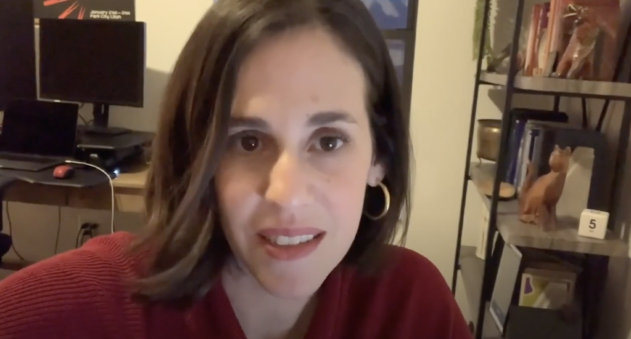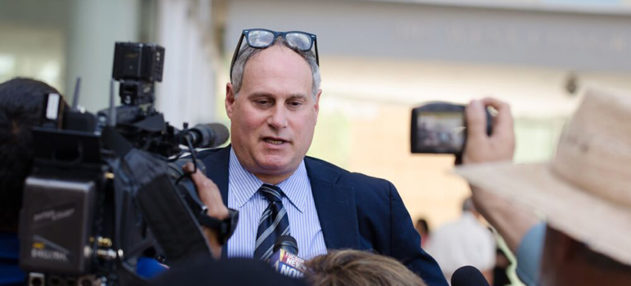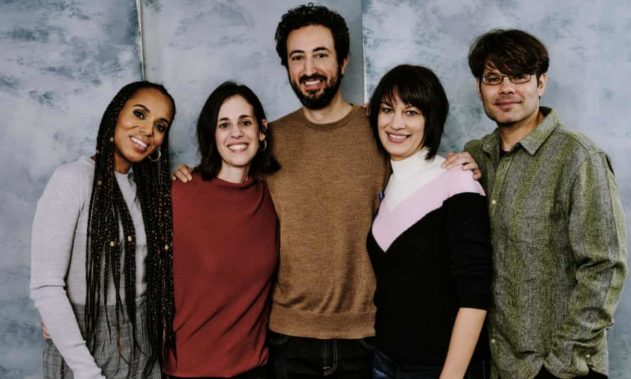ON A CONFERENCE CALL with the filmmakers of “The Fight,” a new documentary about the many battles and the many lives of the ACLU
The documentary is called “The Fight,” which could not be a more à propos title for a film about the ACLU’s ongoing quest to defend not only civil rights, but also the necessity for everyone to enjoy free speech, no matter how odious their views might be.
But the civil rights organization’s mandate became even more demanding during the Trump administration, as the president and his cabinet have sought to make immigration more difficult as well as pushed for greater restrictions on abortion and LGBTQ and voting rights. All of these are issues that ACLU attorneys seen in “The Fight” are continuing to work on.
Filmmaker Elyse Steinberg, who co-directed “The Fight” with Josh Kriegman and Eli Despres (“Weiner”), said that the genesis of the documentary was implanted in 2017, not long after Trump’s so-called “Muslim ban.” When Steinberg saw attorney Lee Gelernt emerge from a Brooklyn courthouse with his fist high, she knew this was a story needing telling.
“It ended up we [filmed] the biggest cases [and] biggest civil rights battle of our time,” Steinberg said on a recent conference call with her fellow filmmakers, producers and lawyers featured in “The Fight.” “It was one of these classic documentary stories: You never know what you’re going to get.”
Her co-director Kriegman said that the project requires his team to be embedded among their subjects for months as they strategized and met with clients.
“Over time folks got to know us and understand who we are as filmmakers and people,” Kriegman said of being with their subjects day and night. “Everyone at the ACLU saw this was a risk worth taking.”
“What motivated me to participate is I wanted someone to document this period in our history,” said Brigitte Amiri, one of the attorneys seen in “The Fight.” “It was important to capture the atrocities the Trump administration was committing … and to ensure this doesn’t happen in our country again.”
Attorney Chase Strangio, the ACLU’s deputy director for transgender justice at the organization’s LGBT & HIV Project, said that there were relatively few trans stories known to the greater public, and thus felt a duty to be that face for many who do not have such visibility.
“There are ways trans-ness is cast as deviant,” Strangio said. “So, I’m going to show a whole family, and show people who hate me and put that out there—along with our incredible clients.
“I think once you see your own story, it is out there forever.”
“Most of the civil rights work is done in a district court or court of appeals and will not get to the Supreme Court, or will not get there for years,” added Lee Gelernt, another lawyer profiled in “The Fight.”
Dale Ho (featured image), who teaches at the NYU School of Law, is also featured in the film. The director of the ACLU’s Voting Rights Project says the students he teaches now are more anxious to get involved than those he encountered even a decade ago.
“They tend to be folks who are joining the [legal] profession because they want to dedicate their careers to moving the ball forward on civil rights issues—or progressive reforms broadly,” said Ho. “People want to see a massive yet structural change in the way that institutions operate in this country and [engage in] conversations about institutional racism.”
“From my standpoint, the response to our work [thanks to] the extreme abuse by Trump over the past few years has been morally clarifying and uniting,” added Joshua Block, another ACLU attorney in “The Fight.” “I think people have joined the ACLU who said they never would have given them a dime before.”
Block points to the organization’s controversial decision to defend the First Amendment rights of those behind the “Unite the Right” rally in Charlottesville, Virginia, in 2017, which ended up in clashes with counter-protestors and the death of one, Heather Heyer. Free speech is important to all, Block said, even if there were many who criticized the ACLU’s working for even the speech of the far right.
“Just because we defended the organizers in Charlottesville doesn’t necessarily stop some of us from saying that was the wrong decision,” Block said. “We protect speech for everybody, including people who [criticize] other people’s speech.”
“Not everyone has the ability to speak equally,” added Strangio, the transgender attorney. “If you feel threatened, then your speech is constrained compared to somebody else’s.”
Watching a film about these issues is one thing, but the filmmakers and subjects of “The Fight” say it’s incumbent upon the community to get involved. Yes, they can donate to the ACLU, but speaking out against injustice and for the rights of all is as equally, if not more, important.
“The last few months have been maddening and depressing, but I’ve also felt a tremendous sense of hope from the activism we’ve been seeing, particularly around the movement for black lives,” said Ho, the law professor. He added that the push for mail-in balloting, at a time when going to the polls is, at best, dangerous, makes him hopeful. “The president votes absentee, as do members of his family. They just don’t want other people to have the same option,” he said, arguing there remains little, if any, evidence of voter fraud perpetrated via the mail, a frequent talking point of the president’s.
“If there’s any silver lining to what’s happened the last four years, it’s that people have gotten engaged in these issues,” said Gelernt, who added that even if Joe Biden wins the presidency in November, so much of what the ACLU works on will not magically be fixed (people can go to ACLU.org to get involved, he said.)
In a crowded documentary landscape, when everyone is forced to be at home and order films at will, even a high-visibility documentary like “The Fight” needs a passionate champion. That came in the form of actress Kerry Washington, who came on board early.
“Documentary work is about acknowledging that even in the most honest work I could create as an actor, I’m always trying to imitate documentary,” the “Little Fires Everywhere” actress said during the conference call. “The role of an actor is to approximate or reach the level of a documentary. It’s really a joy for me to get to do the real thing.”
It’s an ongoing fight, and Washington said that no matter who is in the White House, the work of the ACLU will continue. As does the responsibility of the public, who must continue to vote.
“I wish that all of our film was a post-script about a time that ‘once was,’” Washington said. “We’re still in the trenches.”
“And know that by aligning yourself with this organization, you really are looking out for everybody and living up to those three words, ‘We the people,’ to include all of us.”
“The Fight” will be available to stream beginning Friday.
news via inbox
Nulla turp dis cursus. Integer liberos euismod pretium faucibua





